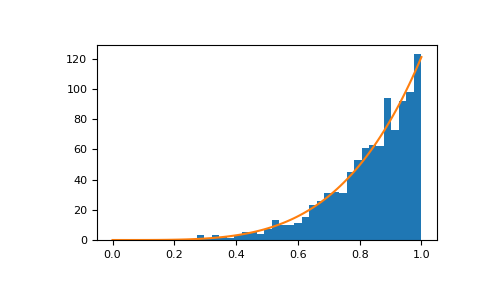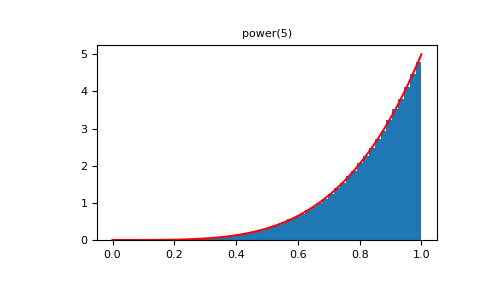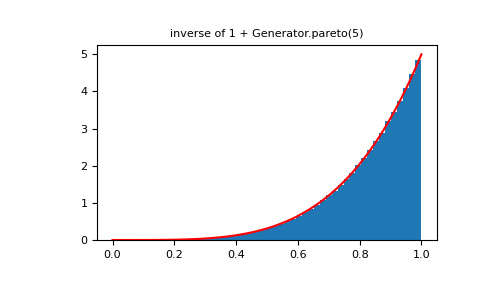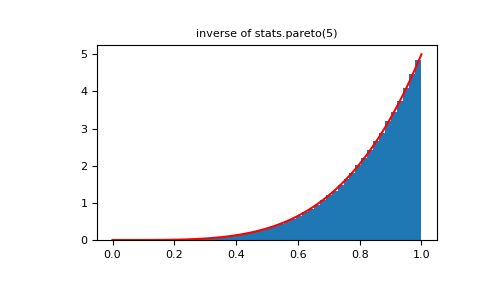numpy.random.Generator.power#
方法
- random.Generator.power(a, size=None)#
从具有正指数 a - 1 的幂分布中在 [0, 1] 范围内抽取样本。
也称为幂函数分布。
- 参数:
- a浮点数或浮点数数组
分布参数。必须是非负数。
- size整数或整数元组,可选
输出形状。如果给定形状为,例如,
(m, n, k),则会抽取m * n * k个样本。如果 size 为None(默认值),则当a是标量时返回单个值。否则,将抽取np.array(a).size个样本。
- 返回:
- outndarray 或标量
从参数化的幂分布中抽取的样本。
- 引发:
- ValueError
如果 a <= 0。
注释
概率密度函数为
\[P(x; a) = ax^{a-1}, 0 \le x \le 1, a>0.\]幂函数分布只是帕累托分布的逆。它也可以看作是 Beta 分布的一个特例。
例如,它用于模拟保险索赔的过度报告。
参考文献
[1]Christian Kleiber, Samuel Kotz, “经济学和精算科学中的统计规模分布”, Wiley, 2003。
[2]Heckert, N. A. 和 Filliben, James J. “NIST 手册 148: Dataplot 参考手册,第 2 卷: Let 子命令和库函数”, 国家标准与技术研究院手册系列, 2003 年 6 月. https://www.itl.nist.gov/div898/software/dataplot/refman2/auxillar/powpdf.pdf
示例
从分布中抽取样本
>>> rng = np.random.default_rng() >>> a = 5. # shape >>> samples = 1000 >>> s = rng.power(a, samples)
显示样本直方图以及概率密度函数
>>> import matplotlib.pyplot as plt >>> count, bins, _ = plt.hist(s, bins=30) >>> x = np.linspace(0, 1, 100) >>> y = a*x**(a-1.) >>> normed_y = samples*np.diff(bins)[0]*y >>> plt.plot(x, normed_y) >>> plt.show()

将幂函数分布与帕累托分布的逆进行比较。
>>> from scipy import stats >>> rvs = rng.power(5, 1000000) >>> rvsp = rng.pareto(5, 1000000) >>> xx = np.linspace(0,1,100) >>> powpdf = stats.powerlaw.pdf(xx,5)
>>> plt.figure() >>> plt.hist(rvs, bins=50, density=True) >>> plt.plot(xx,powpdf,'r-') >>> plt.title('power(5)')
>>> plt.figure() >>> plt.hist(1./(1.+rvsp), bins=50, density=True) >>> plt.plot(xx,powpdf,'r-') >>> plt.title('inverse of 1 + Generator.pareto(5)')
>>> plt.figure() >>> plt.hist(1./(1.+rvsp), bins=50, density=True) >>> plt.plot(xx,powpdf,'r-') >>> plt.title('inverse of stats.pareto(5)')


